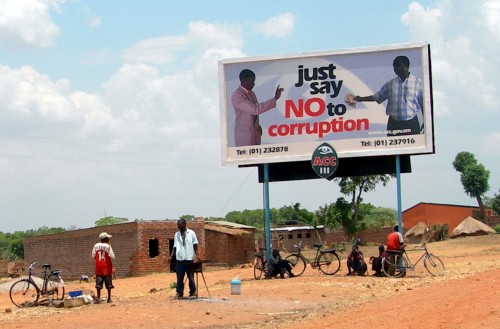Image: An anti-corruption billboard in Zambia (Photo: Lars Ploughmann).
Despite the significant investment, perhaps as much as a hundred million dollars a year, being poured into fighting corruption by the international community, most systemically corrupt countries are considered to be just as corrupt now as they ever were.
Recent events in Ukraine illustrate the urgent need to find out why. As long ago as 2006, Alina Mungiu-Pippidi wrote these prescient words: ‘One year after the widely acclaimed Orange Revolution in Ukraine, one could already buy…a seat in the Ukrainian parliament. The lack of success in curbing corruption, combined with ever more widespread discussion of the issue, renders voters extremely cynical and threatens to subvert public trust in emerging democracies.’
It’s not as if the research community hasn’t been trying, and trying hard, to model explanations that will help policy makers design really effective anti-corruption measures. So far, however, that particular magic theoretical bullet seems to have eluded us. Let’s quickly summarise where we are so far in the story.
Principal-agent theorists see corruption as a problem of funds and resources being channelled away from those who should rightfully either receive them or decide how they are distributed – the principals – by dishonest ‘agents’, usually bureaucrats or officials, and often politicians. Those who interpret corruption in this way point to the technical challenge of monitoring and sanctioning corrupt behaviour. This has been by far the most predominant way of looking at corruption for the last two decades, and it is the interpretation that has influenced the design of most anti-corruption programmes.
However, a growing number of authors argue that anticorruption efforts have failed precisely because they are inspired by principal-agent theory, when collective action theory would offer a better theoretical lens (161 KB). To boil it down to its bones, this theory tells us that when corruption is widely seen as the norm, individuals will have little to gain from resisting temptation if they can’t trust others in their group, community or society to do the same.
In the latest paper from the DLP research team, we unpack this critique and advance several new arguments.
The first is that we don’t believe the two approaches are as mutually exclusive as many authors have so far concluded. When the scope of potential contributions from collective action theory is widened, we find that this theoretical approach proves to be complementary, not contradictory, to a principal-agent theoretical approach.
For instance, both describe the same individual calculations when deciding whether or not to engage in corruption. Both assume individual rationality and that people engage in corrupt acts only when it is in their individual self-interest. Both recognise that the lower the perceived likelihood of discovery, the more likely it is that people will consider acting corruptly.
So it strikes us as much more useful to think about how each theoretical lens can complement the other. Take a politicised bureaucracy where staff are hired through clientelistic networking. Collective action theory will tell us that since ‘everyone is doing it’, it will be hard to persuade anyone to take the lead on shifting to recruitment on the basis of merit. Principal-agent theory will also tell us that even if we find someone willing to take the lead, they may find it difficult to monitor whether their ‘agents’ really are hiring on merit or are, in fact, still doing it the old familiar way.
But we also remind the field that there is a third perspective that is currently being lost: that these theoretical approaches to corruption – as so far applied – both fail to recognise that corruption often persists because it solves problems.
Political will, the lack of which is so often blamed for the failure of so many anti-corruption interventions, is talked about as if it is a mysterious ‘black box’, a self-contained ingredient of policy design. Yet it is clear to us that the box has its own ingredients. These must be unpacked, and the impact of each in the final mix recognised and taken into account, if we are to have any hope of designing effective anti-corruption measures.
So blaming lack of political will is a principal-agent explanation; when we also consider the contribution collective action makes to political will, we can now explain that any principal may lack the political will to act if they cannot trust others to follow suit. It is, therefore, no surprise that effective anti-corruption action has often hinged on the presence of an anti-corruption reform coalition.
If we return to the box and unpack it further, we recognise that corruption may not be simply venal and extractive; sometimes it does the job of ‘solving’ political problems of stability, providing access to state services and serving as a mechanism for political redistribution.
Patron-client relationships may have crucial meaning and purpose for those involved – such as gift-giving in Papua New Guinea, or providing safety and security in Honduras, or – coming back to the example of meritocratic hiring – providing much-needed jobs for friends and family when jobs are very scarce.
This is not a call to romanticize those relationships. It is simply to point out that – as researchers, practitioners and policy-makers – we often wilfully misunderstand them in the drive to condemn corruption.
And we conclude that what makes anti-corruption effectiveness so very difficult to achieve is that, in many cases, initiatives need to take into account insights from all three perspectives. Without recognising this and trying to figure out the real-life political dynamics that underpin corruption, anti-corruption efforts in many countries will continue to fail.











